The "run-up" steps
The draft Law on Vocational Education (amended) is being consulted by the Ministry of Education and Training , aiming to build an open, flexible, and diverse vocational education system, in the direction of standardization, modernization, democratization, socialization, and international integration.
At the same time, the draft also pays special attention to the connection between levels in vocational education as well as connection with other training levels.
Vocational education is given priority in investment plans for socio -economic development, human resources and State budget allocation for education and training. The State focuses on improving the quality of training, developing a network of training facilities according to the plan, focusing on building a number of key high-quality vocational education facilities and colleges that play the role of regional and national centers.
In particular, the State prioritizes synchronous investment in human resource training for key national industries and occupations, occupations that approach regional and international levels; at the same time, it implements a mechanism for ordering and assigning training tasks for specific industries and occupations, in key economic sectors or with high demand but difficult to socialize. The goal is to adjust the industry structure, improve the quality of human resources, especially in high-tech and digital economic fields such as artificial intelligence, data science, semiconductor technology, new materials, etc.
Agreeing with this strategy, MSc. Nguyen Duy Tien - Head of Admissions and Communications Department, Ho Chi Minh City College of Technology, said: Over the past year, the school has developed a project to anticipate trends and provide high-quality human resources for the knowledge economy.
During the project implementation process, Ho Chi Minh City College of Technology conducted a survey of business needs in the coming years, identifying specific requirements for knowledge, skills and expertise for high-tech industries such as artificial intelligence (AI), big data, renewable energy, etc. This is the basis for the school to organize training closely following the needs of businesses and society.
According to MSc. Nguyen Duy Tien, in addition to surveying businesses, Ho Chi Minh City College of Technology also invited leading experts to participate in consulting and building training program content with businesses. The cooperation of all parties will bring valuable advice, helping the school build a project to open training majors suitable for key technology fields, meeting both the actual needs of businesses and the national development strategy.
MSc. Le Hoang Binh Nguyen - Vice Principal of iSPACE College, commented: Over the years, the State has had clear orientations in developing industries belonging to the knowledge economy with new technologies such as AI, semiconductors, digital economy... And this time, those orientations have been specified in the draft Law on Vocational Education.
iSPACE College proactively follows this orientation when building a research project to open new majors related to AI, semiconductors, and big data. In addition to inviting leading experts to participate in consulting on the development of the training program framework, the school also has significant support from domestic and foreign businesses and training organizations.
“We can refer to training programs in developed countries. This is the basis for the school to access effective international training models, then research, edit, and update them to suit the actual conditions in Vietnam,” said Mr. Nguyen.
This activity aims to ensure that the training programs are both up-to-date and relevant to the domestic educational context. iSPACE College is researching the construction of practice rooms, laboratories and expanding facilities to meet the training requirements of high-tech industries.
The Vice Principal of iSPACE College also emphasized that when opening new majors and building new training programs, the facilities must go hand in hand with the quality of the program content. With the characteristic of the college system being 70% of the study time is associated with practice, good preparation of infrastructure and equipment is the key factor to help students quickly access modern technology.
"Hopefully in the near future, colleges will be qualified to train human resources for key national occupations and meet labor market requirements," Mr. Nguyen hopes.
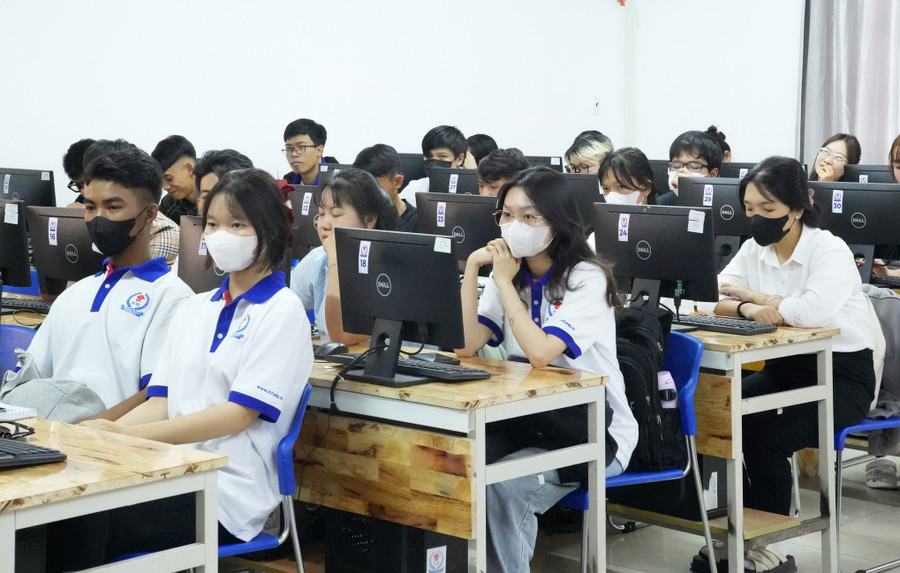
Unified program framework
Supporting the draft Law on Vocational Education with the orientation of developing human resources for high-tech industries, MSc. Le Hoang Bich Thao - Vice Principal of Dai Viet Saigon College, said: previously, the training of human resources for these industries was mainly concentrated in the university system. However, this draft Law has encouraged vocational schools to participate in training, opening up opportunities to expand the supply of high-quality human resources.
However, to implement effectively, according to Ms. Thao, the Ministry of Education and Training and specialized agencies need to have a comprehensive training program framework with clear orientation. Because, if each level of education builds its own program framework for the same major code, the connection from college to university will be difficult, especially in transferring specialized knowledge and skills.
Regarding facilities, Ms. Thao said that not all vocational training institutions have the capacity to train students in high-tech fields. To organize effective training, schools must fully meet the requirements of equipment, technology and qualified teaching staff. These are not small barriers, especially for colleges today.
“The training program needs to have a clear orientation: with a college degree, what knowledge and skills do students need to work in the high-tech field, and what are the specific job requirements? Only then can we have the right orientation and effective human resource training,” Ms. Thao emphasized.
MSc. Nguyen Van Minh Tien - Vice Principal of Saigon Polytechnic College stated that in order to promote the development of high-tech human resources at vocational training institutions, it is necessary to soon have a training program framework that is interconnected between college and university levels.
In reality, when schools build programs, even if they register in the correct order, they still have to make adjustments during implementation to suit the conditions and resources of each school. This leads to a lack of connection between college and university training programs, causing difficulties in transferring and linking.
Recently, Saigon Polytechnic College was sponsored by a large technology corporation with a server system worth billions of dong to serve the training of AI groups. However, to exploit it effectively, Mr. Tien said that there needs to be a standard, interconnected training program framework to help the school build programs and arrange subjects suitable to the existing facilities.
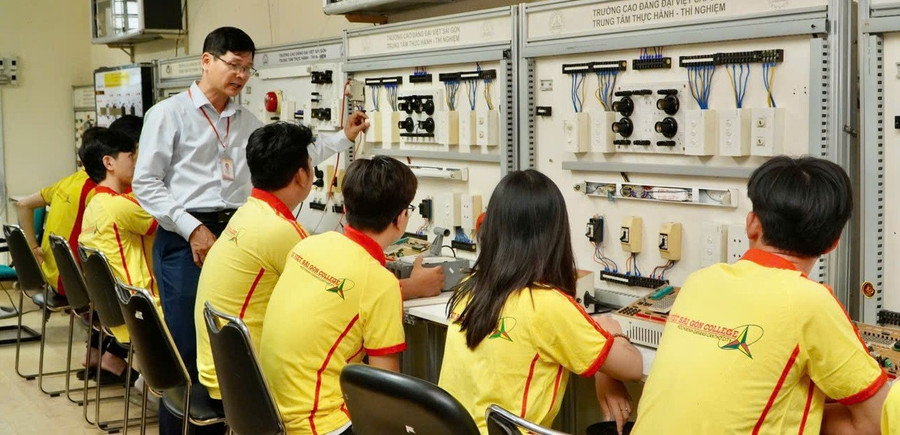
Need for cooperation between universities and colleges
Master Nguyen Van Minh Tien said that high-tech majors such as AI, semiconductor chips, etc. are "hot", attracting great attention from students. However, the admission scores for these majors at universities are often very high. Meanwhile, in developed countries such as Japan, Korea, Taiwan (China), AI majors are recruited with moderate entrance scores to encourage students, creating easier access.
Therefore, Mr. Tien suggested that universities and colleges in Vietnam, when enrolling students in high-tech majors, should set appropriate benchmark scores and at the same time strengthen international cooperation to organize opportunities for students to experience semesters abroad.
Students can study foreign languages in Vietnam, then study abroad in colleges or universities specializing in AI or semiconductors. The government or schools should also have policies to exempt tuition fees and support living expenses for capable students, thereby creating a high-quality human resource, skilled in professions and fluent in foreign languages.
In addition, to develop human resources in the high-tech industry, Mr. Tien said that schools need to design programs that create conditions for students in broad majors such as Information Technology to transfer to narrow majors such as AI, or students in Electrical - Electronics can study additional semiconductor majors.
“Instead of studying for 3 years to get a college degree, students studying Electrical and Electronics can study for another year to get a second degree in semiconductors, thereby expanding career opportunities and meeting the country's human resource needs,” Mr. Tien proposed.
The Vice Principal of Saigon Polytechnic College also said that the training programs transferring from a broad field to a narrow field will help shorten the training time, rapidly increasing the number of high-tech human resources. At the same time, students studying these fields also need to be good at foreign languages, especially English - the global language in communication, cooperation and implementation of technology projects with international partners.
In Ho Chi Minh City, a number of colleges have officially joined the race to train human resources in the semiconductor industry at the college level. From the 2024-2025 school year, Ho Chi Minh City International College has enrolled students in the college system and the 9+ college system (enrolling from grade 10), for high school and middle school graduates.
The special thing is that after completing the college program in Vietnam, students will have the opportunity to receive a full INTENSE scholarship to continue studying in Taiwan (China) for 2 years in the fields of semiconductors and finance. The scholarship program is organized at regular universities in Taiwan, helping students access modern education and advanced technology.
At Cao Thang Technical College, among the 18 majors/occupations expected to enroll students in 2025, the school has officially opened the major of Semiconductor and Microchip Engineering Technology under the Electronics and Telecommunications Engineering Technology major.
Source: https://giaoducthoidai.vn/cuoc-dua-nhan-luc-nganh-cong-nghe-cao-post750054.html


![[Photo] The 1st Congress of Phu Tho Provincial Party Committee, term 2025-2030](https://vphoto.vietnam.vn/thumb/1200x675/vietnam/resource/IMAGE/2025/9/30/1507da06216649bba8a1ce6251816820)
![[Photo] Panorama of the cable-stayed bridge, the final bottleneck of the Ben Luc-Long Thanh expressway](https://vphoto.vietnam.vn/thumb/1200x675/vietnam/resource/IMAGE/2025/9/30/391fdf21025541d6b2f092e49a17243f)
![[Photo] Solemn opening of the 12th Military Party Congress for the 2025-2030 term](https://vphoto.vietnam.vn/thumb/1200x675/vietnam/resource/IMAGE/2025/9/30/2cd383b3130d41a1a4b5ace0d5eb989d)

![[Photo] President Luong Cuong receives President of the Cuban National Assembly Esteban Lazo Hernandez](https://vphoto.vietnam.vn/thumb/1200x675/vietnam/resource/IMAGE/2025/9/30/4d38932911c24f6ea1936252bd5427fa)
![[Photo] General Secretary To Lam, Secretary of the Central Military Commission attends the 12th Party Congress of the Army](https://vphoto.vietnam.vn/thumb/1200x675/vietnam/resource/IMAGE/2025/9/30/9b63aaa37ddb472ead84e3870a8ae825)
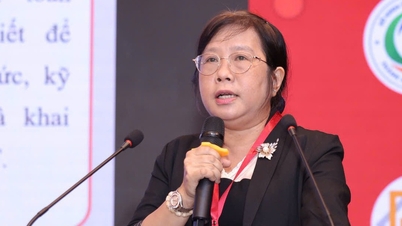
















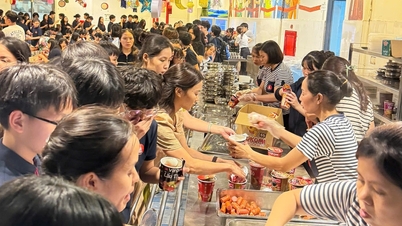
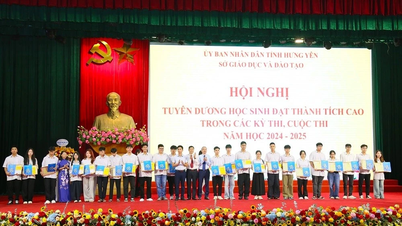






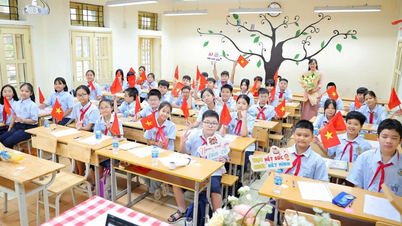
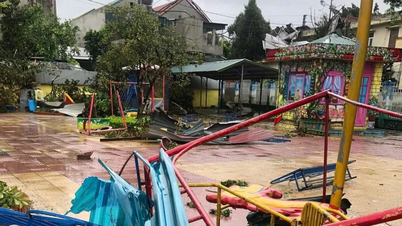
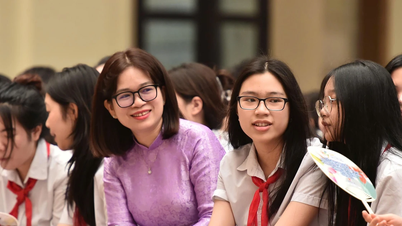
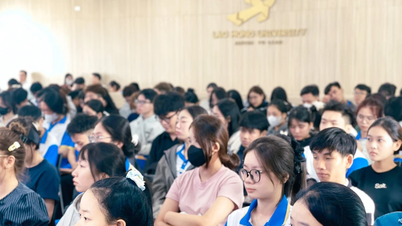




















































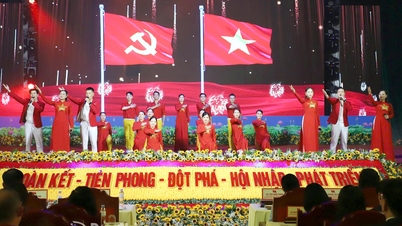
















Comment (0)